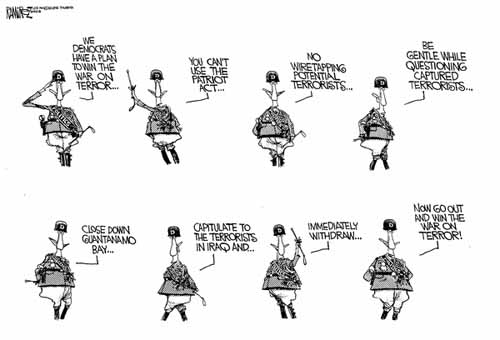
Democrats Plan to Win The War
But seriously folks... Here's a few words Reid may regret. On December 20, 2005 with what may be the opening of the 2006 campaign to control congress, Senate MINORITY Leader Reid gloated: "We killed the Patriot Act (see video here).
Interestingly, on Wednesday, Senator Reid called for the resignation of Homeland Secretary Chertoff because Chertoff was not giving enough attention to Las Vegas which Reid acknowledges is a prime terror target. On the one hand, Reid complains that Vegas doesn't get enough support on the war on terror, on the other, he gloats that he just "killed" the legislation that enables us to protect Vegas and the rest of America.
On another note: is there ONE member of the Bush Administration with responsibility for national security that Reid and company have not demanded resign or be impeached?
A Democrat Coup Against Pelosi?
Meanwhile, over in the House of Representatives things are no better. Robert Novak had a telling insider piece regarding House M I N O R I T Y Leader Nancy Pelosi:
The Nancy Problem by Robert Novak: House Minority Leader Nancy Pelosi had just finished a typically discursive floor speech shortly before the year-end adjournment when a very liberal member approached her second-in-command, Minority Whip Steny Hoyer, and whispered in his ear: "Steny, is it not time for a coup?"California blogger Flopping Aces, has more on the Nancy Problem, or what they in California call "The Pelosi Headache." Thanks Moonbattery for pointing me to the cartoon.
It obviously was not time to oust Pelosi and replace her with Hoyer. House Democrats do not get rid of their leaders with coups, as Republicans have during the last half-century. Nevertheless, dissatisfaction with Pelosi's performance is pervasive across the ideological spectrum. Her colleagues grumble that under her leadership, the party lacks focus and a clear agenda necessary to take advantage of Republican disarray.
This deficiency is referred to by some House Democrats as "the Nancy problem," but it really transcends failings of their party leader. They remain tied to obsolete practices that freeze in place aged committee leaders. Their rhetoric betrays inability to free themselves from New Deal tax-and-spend policies.
...
Many Democrats inside and outside of Congress see the wrong person elevated as their House leader by accident of geography. It is hard to deny that Hoyer surpasses Pelosi in backroom strategy sessions, in floor debate or in television interviews. The man from southern Maryland seems a better voice for a party trying to expand its base than the woman from San Francisco.
...
When Rep. John Murtha in effect called for immediate U.S. military withdrawal from Iraq, Pelosi in the secrecy of the party caucus embraced that dangerous political course. After two weeks of internal debate, Pelosi backed down to Hoyer's position of effectively letting the House members individually pick their own way.
It is not ideology, however, that makes many Democrats yearn for Hoyer. The congressman who whispered about a coup in Hoyer's ear is much closer to Pelosi ideologically. He and other Democrats are simply appalled by Pelosi's image as a party leader. While she got by delivering 60-second speeches as an ordinary congresswoman, she seems distracted and lost in making four-minute Democratic closing arguments on a bill.
Pelosi neither sets an agenda nor offers inspiring messages, but she cannot be held wholly responsible for the superficial quality of Democratic rhetoric from the House floor. Debate on bills ordinarily is led by the senior committee member, who is bound by cliches and stereotypes. One of the best and longest lasting of Newt Gingrich's reforms when he became House speaker in 1995 was to institute term limits for Republican committee heads. The Democrats keep their leaders as long as they live.
The Democratic management of legislation in the House is handled by the likes of John Dingell, 79, Energy and Commerce Committee (25 terms); Tom Lantos, 77, International Relations (13 terms); John Conyers, 76, Judiciary (21 terms); David Obey, 67, Appropriations (18 terms); and John Spratt, 63, Budget (12 terms). These are men who generally talk about moving the previous question more than moving the nation.
No comments:
Post a Comment